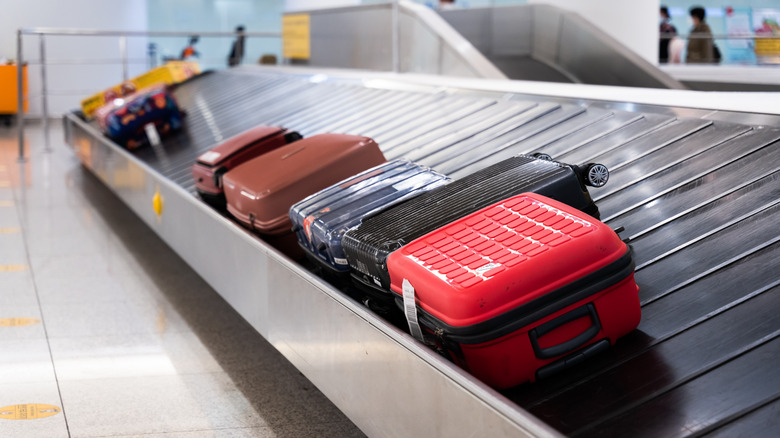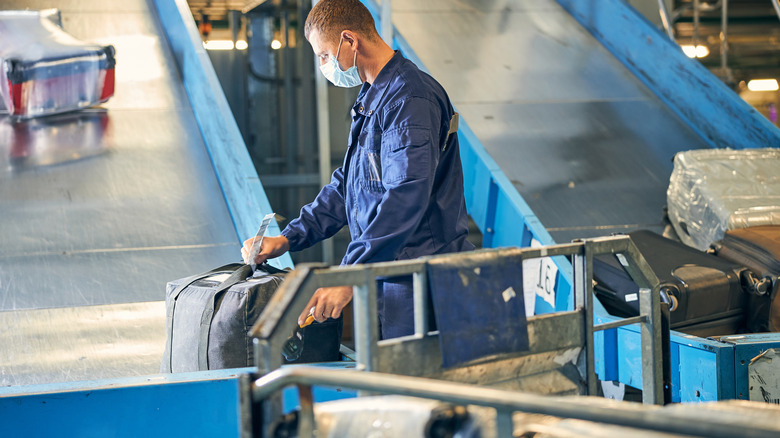The Best Thing To Do When Disaster Strikes And TSA's Conveyor Belt Damages Your Luggage
No matter where you're going or how long you'll be there for, traveling can often come with its own set of not-so-exciting complications. From getting blindsided by an annoying flight delay to navigating busy airports filled with other already-frustrated travelers — not to mention all the slow walkers — there's always the possibility of something going wrong when you least expect it (or when you just aren't in the mood, to be honest).
However, no amount of careful planning or using AirTags on your bags can truly prepare you for the sinking feeling that comes with discovering that your checked luggage was damaged — or that your items are missing altogether — during your journey. Luckily, there are immediate steps you can take to protect yourself (and your things), as well as seek compensation for your losses — and it all starts with filing a claim. Nothing that exciting, sure, but definitely necessary. Because whether your checked luggage has seen better days — or your bag gets into a bit of hands-on trouble with the TSA agent inspecting it — there are various options for resolving these situations.
What to do when your luggage gets damaged
First things first, as soon as you see that your luggage has been damaged — whether because of a conveyor belt snag or rough handling — it's important that you get in touch with both TSA and your airline within 24 hours. Along with this, it's worth noting that TSA will require thorough documentation of your loss or damage and evidence of their responsibility in said incident. Once you've provided all of that, the process can take between 60 and 90 days, and the final verdict will ultimately depend on the evidence and documentation at hand.
Beyond photos, there's another key detail that'll be essential in helping you file a successful claim to the TSA: an official slip that confirms TSA did, in fact, go through your luggage — which agents are required to leave every time they inspect a checked bag. This small slip will be a crucial piece of evidence while filing your claim — especially considering that TSA often denies culpability for bags they never "officially" opened. Knowing whether or not a TSA official actually opened and handled your belongings will ultimately give you a better understanding of whether or not your claim will hold up.
That said — and this might not be the news you wanted to hear — it's important to mention that, despite having the evidence to back it up, not all claims are guaranteed to succeed. In fact, according to a study by NJ Advance Media, out of 34,127 claims filed between 2010 and 2017 at the busiest airports in the country, only 26% of them were approved — a pretty dismal number given the circumstances.
Can the airline take the blame for damaged luggage?
Alternatively, if the luggage damage happened during airline handling rather than TSA inspection, there are additional options for compensation. For starters, it's important to know that airlines in the U.S. are legally required to take responsibility for damage to your luggage — including wheels, straps, zippers, and handles — despite what their websites might claim. Better yet, this requirement comes directly from the U.S. Department of Transportation, which can even fine airlines for any actions that are in direct violation of consumer protection laws; like, for example, refusing to process damage claims from passengers.
Ultimately, the key here is to thoroughly document the damage and immediately file your claim before you've even left the airport. As for evidence, make sure to include clear before and after photos of your bags, and to get written confirmation from airline staff about your report. Depending on the airline you traveled with, you can even check the lost or damaged luggage policies (typically available through the airline's website) to get a better understanding of what is covered and what is not, in order to prepare. And if that still doesn't help, you can go straight to the source and get the law involved over lost or damaged luggage by contacting the Department of Transportation to let them know about your situation.


